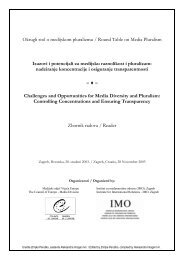almanac on security sector oversight in the Western Balkans
almanac on security sector oversight in the Western Balkans
almanac on security sector oversight in the Western Balkans
Create successful ePaper yourself
Turn your PDF publications into a flip-book with our unique Google optimized e-Paper software.
Croatia<br />
On <strong>the</strong> sec<strong>on</strong>d topic <strong>the</strong> ma<strong>in</strong> processes <strong>in</strong>fluenc<strong>in</strong>g development of <strong>the</strong> <strong>security</strong> <strong>sector</strong><br />
structures can be summarised as follows:<br />
• political <strong>in</strong>fluence of rul<strong>in</strong>g political elite;<br />
• external-<strong>in</strong>ternati<strong>on</strong>al politics and <strong>the</strong> mark <strong>on</strong> societal and adm<strong>in</strong>istrative<br />
development;<br />
• development of legal framework c<strong>on</strong>sistent with European democratic standards;<br />
• build<strong>in</strong>g adm<strong>in</strong>istrative capacities <strong>in</strong> cooperati<strong>on</strong> with NATO and EU partner<br />
countries;<br />
• implementati<strong>on</strong> of normative framework <strong>in</strong> l<strong>in</strong>e with comm<strong>on</strong> standards and<br />
procedures;<br />
• f<strong>in</strong>ancial accountability of state adm<strong>in</strong>istrati<strong>on</strong>;<br />
• transparency as a measure of openness of official structures;<br />
• cultural acceptance / <strong>in</strong>ternalisati<strong>on</strong> of values and departure from less optimal govern<strong>in</strong>g;<br />
and<br />
• <strong>in</strong>fluence of civil society <strong>in</strong> process of societal change and SSR.<br />
2.1. Outl<strong>in</strong><strong>in</strong>g <strong>the</strong> c<strong>on</strong>text<br />
The Croatian example shows that state build<strong>in</strong>g, democratisati<strong>on</strong> and SSR are lengthy<br />
processes. There is a unique historical, political and societal c<strong>on</strong>text, as well as stages<br />
that are represented with<strong>in</strong> <strong>the</strong> chr<strong>on</strong>ological framework of this chapter.<br />
The <strong>in</strong>itial period of state build<strong>in</strong>g (1990-1995) was marked by war and occupati<strong>on</strong> of<br />
almost a third of Croatia. In 1989, most former communist states <strong>in</strong> Central and Eastern<br />
Europe changed <strong>the</strong>ir systems and started to move towards <strong>the</strong> EU and NATO. This<br />
was usually accomplished simply by chang<strong>in</strong>g political systems. Croatia, unfortunately,<br />
needed a more difficult road. This prevented Croatia from advanc<strong>in</strong>g fur<strong>the</strong>r towards<br />
Euro-Atlantic <strong>in</strong>tegrati<strong>on</strong>. Croatians were forced to cope with problems of war and<br />
need<strong>in</strong>g to fight for <strong>in</strong>ternati<strong>on</strong>al recogniti<strong>on</strong>. In additi<strong>on</strong>, <strong>in</strong>ternal politics did not<br />
br<strong>in</strong>g democracy and <strong>the</strong> rule of law and certa<strong>in</strong>ly did not meet criteria for Euro-<br />
Atlantic <strong>in</strong>tegrati<strong>on</strong> as with o<strong>the</strong>r ex-communist countries. Initially, negative c<strong>on</strong>sequences<br />
of <strong>the</strong> rigid domestic and foreign policies were mediated by <strong>the</strong> status of<br />
victim of <strong>the</strong> aggressive war, but after miscalculated <strong>in</strong>volvement <strong>in</strong> events <strong>in</strong> Bosnia<br />
and Herzegov<strong>in</strong>a (BiH) it became progressively harder to ma<strong>in</strong>ta<strong>in</strong> this positi<strong>on</strong>.<br />
This period of “democratic deficit” (1995-2000) represented an era of semi autocratic<br />
regime with all its negative c<strong>on</strong>sequences. It is clear that <strong>the</strong>se first two periods, given<br />
<strong>the</strong> very nature of <strong>the</strong> political and <strong>security</strong> envir<strong>on</strong>ment, had very little <strong>in</strong> comm<strong>on</strong><br />
with real democratisati<strong>on</strong> and almost noth<strong>in</strong>g to do with SSR and overall reform.<br />
On <strong>the</strong> c<strong>on</strong>trary, <strong>the</strong> period start<strong>in</strong>g with <strong>the</strong> electoral and c<strong>on</strong>stituti<strong>on</strong>al changes <strong>in</strong><br />
2000 opened new opportunities for <strong>the</strong> country to <strong>in</strong>itiate necessary reforms, <strong>in</strong>clud<strong>in</strong>g<br />
SSR, and take part <strong>in</strong> <strong>the</strong> accessi<strong>on</strong> process of <strong>the</strong> EU and NATO. This has brought<br />
77<br />
Almanac <strong>on</strong> Security Sector Oversight <strong>in</strong> <strong>the</strong> <strong>Western</strong> <strong>Balkans</strong>



